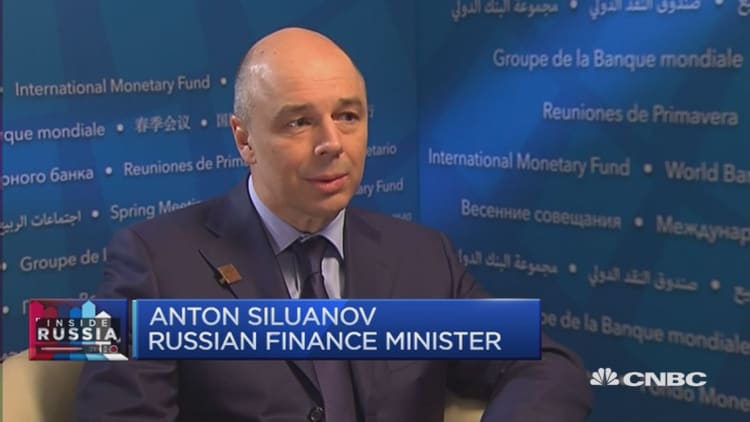

Low oil prices, economic sanctions, political isolation and capital outflows have made for a torrid couple of years for Russia's economy, but the country's finance minister has told CNBC that the worst is now over.
"We see that growth rates of the economy are improving, to be more precise, the slowdown of the last year was a contraction (in gross domestic product) of 3.7 percent and this year we are expecting a contraction of 0.3 percent," Anton Siluanov told CNBC on the outskirts of the International Monetary Fund (IMF) and World Bank spring meetings in Washington D.C.
"We expect growth rates to be restored at the end of the year," he added.
Russia is one of the world's largest oil exporters but its economy has been hit by a double-whammy of low oil prices and international sanctions. Western nations imposed the penalties for its annexation of Crimea and what they called its "deliberate destabilization" of eastern Ukraine.
Lower and cheaper oil exports have hit government revenues hard but the finance minister said that the oil price had presented Russia with an opportunity to "further develop non-raw material industries" and diversify its economy away from the commodity.
"What is important is that the structure of the economy is changing. So-called tradable sectors which were depressed, during the period of the high oil prices and strong ruble rate, are now growing while the so-called non-tradable sectors are today in a worse situation," he said.
The structural shift in the economy could also, he hoped, "stimulate the growth of those sectors and bring added value to our economy which will not be dependent on the commodities sector, but will be more dependent on technology reach and industrial sectors."
Sanctions were first imposed on Russia in mid-2014 soon after its annexation of Crimea in Ukraine – deemed to be illegal violation of Ukraine's sovereignty by the U.S. and Europe -- and since then, several rounds have been imposed to ratchet up the pressure on the country.
EU sanctions were extended in December until July 2016 and the EU said it was ready to reverse its actions and to "reengage with Russia when it starts contributing actively and without ambiguities to finding a solution to the Ukrainian crisis."
Remarking on the sanctions, Siluanov said his economic projections were based "on the assumption that the sanctions stay in place."
"We base our projections on the assumption the sanctions stay in place. I want to say that the economy as a whole has adapted both to the new external economic conditions and to the conditions of those restrictions," he said.
"Of course, any sanction is a bad thing but in any case one has to continue working and the economy, like I said, is adapting. And our task now is to make our budget obligations aligned with the new economic conditions."






